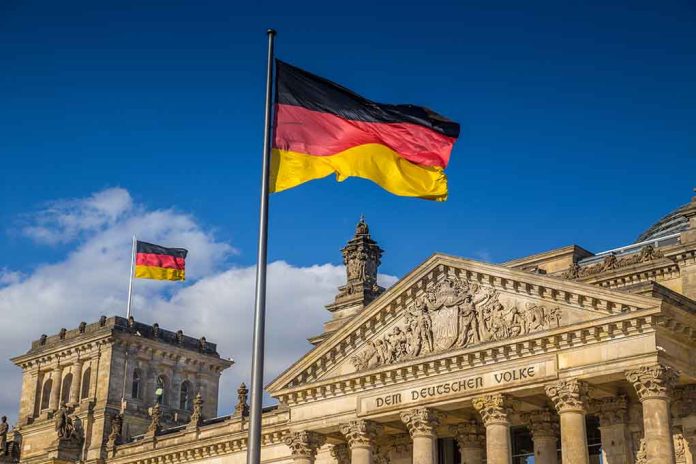
Germany faces a political crossroads as a fractured coalition grapples with internal strife and the repercussions of Trump’s victory in the U.S.
At a Glance
- Germany’s coalition collapses following the dismissal of Finance Minister Christian Lindner.
- Chancellor Scholz plans to lead a minority government with the Social Democrats and Greens.
- Opposition leader Friedrich Merz demands a no-confidence vote and early elections.
- Lindner’s budgetary restraint clashed with Scholz’s vision for increased state spending.
Coalition Collapse Amid Economic Disputes
The dissolution of Germany’s government coalition began when Chancellor Olaf Scholz removed Christian Lindner, leader of the Free Democrats (FDP), from his post as finance minister. Lindner’s conservative fiscal approach, aimed at preparing for potential economic challenges, clashed with Scholz’s strategy of increasing spending on social initiatives. This conflict exposed deeper rifts within the coalition and raised concerns about Germany’s political stability amidst international diplomatic uncertainties.
With the coalition disbanded, Scholz intends to govern with a minority setup comprising the Social Democrats and the Greens. This temporary arrangement is expected to last until early next year, during which Scholz aims to maintain legislative order while navigating through ongoing economic and political challenges.
A Call for Early Elections
Friedrich Merz from the Christian Democrats has called for a no-confidence vote, pushing for early elections. Merz’s challenge reflects broader frustrations with the current administration’s handling of its fiscal disagreements, with calls for urgent action amidst Germany’s uncertain future due to external factors, such as recent developments in U.S. politics.
“The coalition no longer has a majority in the German Bundestag, and we therefore call on the chancellor … to call a vote of confidence immediately, or at the latest by the beginning of next week.” said Merz.
The unfolding situation has caused unease in Germany’s political and economic sectors, with Scholz seeking a vote of confidence by January 15. This could potentially lead to early elections in March, a move wrought with complexities considering the ongoing impact of foreign diplomatic shifts.
New Appointments and Internal Fractures
President Frank-Walter Steinmeier took decisive action by dismissing Lindner and two other FDP officials, but tensions remained, as Transport Minister Volker Wissing chose to leave the party while staying in his role. Meanwhile, changes have been made with Jörg Kukies becoming the new finance minister and Cem Özdemir taking on additional ministerial responsibilities, highlighting the adaptability required to manage Germany’s present political landscape.
In the wake of these changes, the government must now focus on unity and effective governance to ensure Germany can face domestic and international challenges head-on. The ability to reconcile policy differences and adapt to an evolving political landscape will be crucial for future stability and prosperity.
Sources:
- https://www.union-bulletin.com/news/world/germanys-coalition-collapses-hurling-the-countrys-politics-into-turmoil/article_9fc292ee-86f5-5440-aaf2-d5540cda6cbc.html
- https://dnyuz.com/2024/11/06/german-government-collapses-amid-uncertainties-over-u-s-election/
- https://foreignpolicy.com/2024/11/06/germany-coalition-government-collapse-scholz-lindner-budget-spending-trump/










